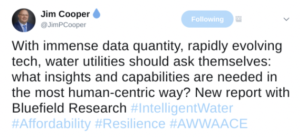As a company in the business of developing smart water solutions, we’ve grown increasingly curious about the conversation happening around intelligent water. It was all a buzz at ACE 2019, so we decided to take a deeper dive.
What exactly is “Intelligent Water?”
Jim Cooper, the Intelligent Water Lead at Arcadis, states that “‘smart water’ comes out of a bottle. Intelligent water comes from the tap.” Intelligent water picks up where smart water leaves off. Historically, the term smart water referred to the technology of the devices today. Every device claims to be smart now, but intelligent water takes a more human-centric approach. Those researching intelligent water are looking at the implications of the processing power and impacts of AI that can come from people and technology working together.
There certainly is increasing research on intelligent water, and the topic is even reaching podcasts. (If this is a topic that interests you, Jim Cooper is a great Twitter follow for it, as is the hashtag itself.)
Why does this concept matter?
A few different reasons, but we’ll begin with cost. Intelligent water could save U.S. water utilities about $17.6 billion by 2027.
Here’s how: in 2017, maintenance spending reached an all-time high of $50.2B over capital spent. Interconnected: only about 21% of utilities currently say they can fully cover the cost of services, and within the next five years, 36% of households may not be able to afford water. We’re nearing a tipping point, and new technologies need to come into play.
Jim Cooper states that for the industry to move forward, we have to step away from the status quo:
“Intelligent Water helps experts make the right decisions at the right times by revealing data about people and their relationship with their water, and by shedding insights into the effects of changing economic, environmental, social and political conditions,” said James Cooper, Intelligent Water lead for Arcadis. “But in order to realize these benefits, the industry must be willing to challenge the status quo.”
Ah, and now we come to the next step.
How will we challenge the status quo?
Cooper and others have endorsed a three-step process that utilities should go through:
- Empower a culture of innovation to incorporate new ideas, solutions, and opportunities
- Be driven by customer needs, not by technology
- Focus on collective intelligence, where skilled workers make data-driven decisions
No. 2 might be the most challenging for some but remember: Water and the entire utility ecosystem is about people. Technology helps greatly and can be a force multiplier for necessary affordability decisions. But technology shouldn’t be what drives innovation and intelligent water developments. It should aid in the processes, but customer needs should be at the forefront.

The reason that intelligent water is happening now is two-fold:
- Utilities need a path to better affordability ASAP.
- The data is now there.
Most conversations in any industry right now about being “data-driven” can seem buzzworthy at first, but these are tremendously important discussions. The data is there, and the tech is there. Now it’s time to turn that data into customer-benefiting decisions.
Meters: Smart or Intelligent?
Master Meter’s line of software and meters fit nicely into the category of smart water solutions, but we’re excited about the potential to pair our products with features like AI that help customers glean more useful data from their system. Meter data management systems, such as Harmony, are the first step. It demonstrates the possibility of what’s next by combining smart water systems with human-centric solutions that are exciting for both water utilities and the customers they serve.
At ACE 2019, we revealed the first phase of “Just Ask Alexa.” This feature allows customers’ Alexa systems to pair with the data from their meters to quickly and easily access information about their water usage. Perhaps a homeowner finds a broken sprinkler head and is concerned about the amount on the next water bill. They can “Just Ask Alexa” and instantly find out. Solutions like these may seem trivial, but they are solutions built with the customer in mind and not just a flashy new product feature. Creating solutions with the end user in mind is what intelligent water is all about. We’re excited to be a part of the conversation.

